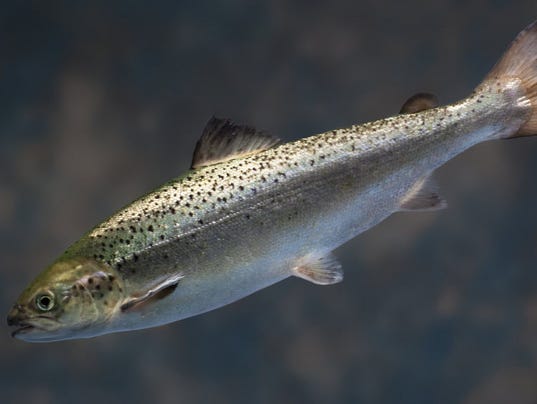Victory for Frankenfish and for Mother Earth: Column [???]
If you care about the environment and a green future, genetically modified salmon is just the beginning.
After 20 years of regulatory scrutiny and
political wrangling, the Food and Drug Administration finally approved a
genetically modified salmon, one scientists say delivers large
environmental benefits over existing farmed salmon.
Ironically, the salmon, known as AquAdvantage, was hotly opposed by environmental groups.
“This technology was about to be lost,” says Purdue University scientist William Muir, whose research helped the FDA decide that the fish produced by AquaBounty Technologies is safe. “Nobody will invest in technology that can’t be commercialized, and you can’t commercialize without FDA approval.”
The AquAdvantage salmon grows to adult size twice as fast — in two rather than four years — and requires 20% less feed than today’s Atlantic salmon, 100% of which are already farmed.
[SOL:
"Atlantic Salmon": is the trademark name for farmed salmon, which has
to be fed SPECIAL color pills to make the meat pink like wild salmon.
"ATLANTIC SALMON" ARE NOT CAUGHT IN THE ATLANTIC. To get natural salmon
they have to be WILD CAUGHT.]
It
also requires no antibiotics, unlikely conventionally farmed Atlantic
salmon, which public health officials warn can contribute to antibiotic
resistance.
“AquAdvantage salmon is as safe to eat as any non-genetically engineered Atlantic salmon, and also as nutritious,” the FDA says.
But
two large supermarket chains, Trader Joe’s and Whole Foods, say they
will not carry the AquaBounty fish, even as spokespersons from both
companies acknowledged that they sell other foods made with genetically
modified ingredients or feed.
Ninety percent of the world’s fish stocks are either over-fished or at capacity, but global demand for fish is expected to double by 2050 as the human population grows and poor nations become richer.
AquAdvantage
will be the first Atlantic salmon produced on land in warehouses, the
method favored by environmental groups. Being produced on land spares
natural ocean environments the disruption of large farms complete with
pens and motorboats.
Where
8 pounds of feed is required to create one pound of beef, just 1 pound
of feed is required to create 1 pound of AquAdvantage salmon, the
company says.
Local
production reduces the pollution from flying salmon in by jet.
AquaBounty says it will produce 90% fewer climate-changing carbon
emissions. [SOL: IS THIS THEIR SELLING POINT?]
Environmental groups, including the Natural Resources Defense Council (NRDC) and Sierra Club,
hotly oppose FDA approval, pointing to the risk that the fish could
contaminate and drive wild salmon populations to extinction.
In response to the decision, the head of the Center for Food Safety, an environmental group, announced it would file a lawsuit to stop “the introduction of this dangerous contaminant.”
But
Muir, the Purdue University researcher who 15 years ago first raised
the concern that genetically engineered fish could threaten wild fish
stocks, disagreed. What makes the fish great for farming also
dramatically lowers its ability to thrive in the wild, he says.
“I
won’t argue that a genetically engineered salmon will never find its
way into the ocean,” Muir explains. “But there’s nothing in this fish
that would last more than a single generation because of its low
fitness."
If
the newly approved fish is a success in the market, it could be the
beginning of a new industry. Muir says the technique of genetically
modifying animals offers the possibility of eliminating avian flu, which
has killed 440 people, according to the World Health Organization, but which many fear could create a global epidemic killing many thousands.
“We
know there are transgenic methods to address avian flu," Muir
says, "but nobody is trying to come up with a solution because you can’t
get venture capital and can’t take it to market.”
As
for Trader Joe’s and Whole Foods, AquaBounty CEO Ron Stotish was upbeat
he could change their minds. “We not only share all of their
environmental concerns, our product addresses them,” he says. “We are
hopeful that over time, they will embrace our product.”
The
past few years have seen a growing consensus on the safety of
genetically modified foods. This year, after Mexican food retailer Chipotle announced it would phase out genetically modified ingredients, it faced a public backlash.
That backlash accelerated this month after more than three dozen customers were stricken with the bacteria E. coli from
its restaurants, viewed as a result of the company’s focus shifting
from safety and cleanliness to unscientific issues such as GMOs.
Fearing
marginalization, mainstream environmental groups have started to tone
down fear-based campaigning, but they should go further and encourage
Whole Foods and Trader Joe’s to carry AquAdvantage, and work with President Obama and
Congress to step up public and private research into using genetic
modification to benefit public health and the environment.
Michael Shellenberger is president of the Breakthrough Institute .
In addition to its own editorials, USA TODAY publishes diverse opinions from outside writers, including our Board of Contributors. To read more columns like this, go to the Opinion front page .

No comments:
Post a Comment